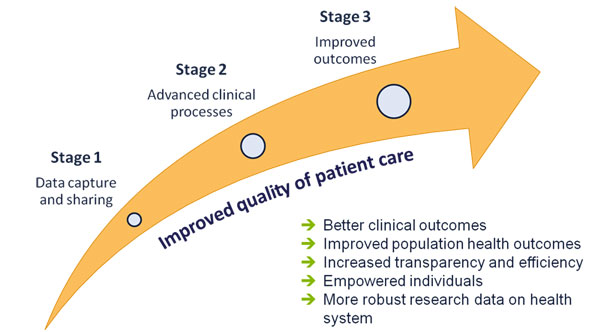
As the HIMSS15 extravaganza is getting under way, and every EHR vendor flush with cash from the Meaningful Use bonanza is preparing to take its unusable product to the next level, machine interoperability is shaping up to be the belle of the ball.
Interoperability in health care is all the rage now. After publishing a ten year interoperability plan, which according to the Federal Trade Commission(FTC) is well position to protect us from wanton market competition and heretic innovations, the Office of the National Coordinator for Health Information Technology (ONC) published the obligatory J’accuse report on information blocking, chockfull of vague anecdotal innuendos and not much else. Nowadays, every health care conversation with every expert, every representative, every lobbyist and every stakeholder, is bound to turn to the lamentable lack of interoperability, which is single handedly responsible for killing people, escalating costs of care, physician burnout, poverty, inequality, disparities, and whatever else seems inadequate in our Babylonian health care system.
When you ask the people genuinely upset at this utter lack of interoperability, what exactly they feel is lacking, the answer is invariably that EHRs should be able to talk to each other, and there is no excuse in this 21st iCentury for such massive failure in communications. The whole thing needs to be rebooted, it seems. After pouring tens of billions of dollars into building the infrastructure for interoperability, we are discovering to our dismay that those pesky EHRs are basically antisocial and are totally incapable or unwilling to engage in interoperability. The suggested solutions range from beating the EHRs into submission to just throwing the whole lackluster lot out and starting fresh to the tune of hundreds of billions of dollars more. When it comes to sacred interoperability, money is not an object. It’s about saving lives.
As the HIMSS15 extravaganza is getting under way, and every EHR vendor flush with cash from the Meaningful Use bonanza is preparing to take its unusable product to the next level, machine interoperability is shaping up to be the belle of the ball. A simple minded person may be tempted to wonder why people who, for decades, manufactured and sold EHRs that don’t talk to each other, are all of a sudden possessed by interoperability fever. The answer is deceptively simple. After exhausting the artificially created market for EHRs, these powerful captains of industry figured out that extracting rents for machine interoperability is the next big thing.
The initial pocket change comes from selling machine interoperability to their current bewildered (or stupefied) clients, and to less fortunate EHR vendors. But the eventual windfall will not come from the health care delivery system or the hapless patients caught in its web. How much do you think access to a national and hopefully global network of just-in-time medical and personal data is worth to, say, a pharmaceutical company giant? How about life insurance, auto insurance, mortgage, agribusiness, cosmetics, homeland security, retail, transportation? Google built an empire by piecing together disjointed bits of personal data flowing through its electronic spider webs. What do you think can be built by combining everything Google knows with everything your doctor knows and everything you know about yourself?
Machine interoperability is not about patient care in the here and now. Interoperability is not about ensuring that all clinicians have the information they need to treat their patients, or that patients have all the information they need to properly care for themselves. Interoperability is about enriching a set of interoperability infrastructure and service providers and about electronic surveillance of both doctors and their patients. Machine interoperability is about control, power and boatloads of hard cash.
For example, if you are hospitalized, it makes sense that your primary care doctor should know that you are (not in the past tense), and when you are discharged, he or she should be appraised of what transpired during your hospital stay. In the old days, before the advent of hospitalists, this could be assumed. Today, thanks to more efficient division of labor, not so much. If the government was genuinely concerned about smooth transitions of care, it would mandate that upon discharge, hospitals must provide all pertinent information to the primary care doctor, and the patient, by any means necessary. If this meant that a piece of paper is stapled to the patient’s robe, and that the hospital employs an army of delivery drones for the purpose, so be it. Eventually, hospitals, which are big businesses, would come up with the most cost effective and efficient way to be compliant with the law.
